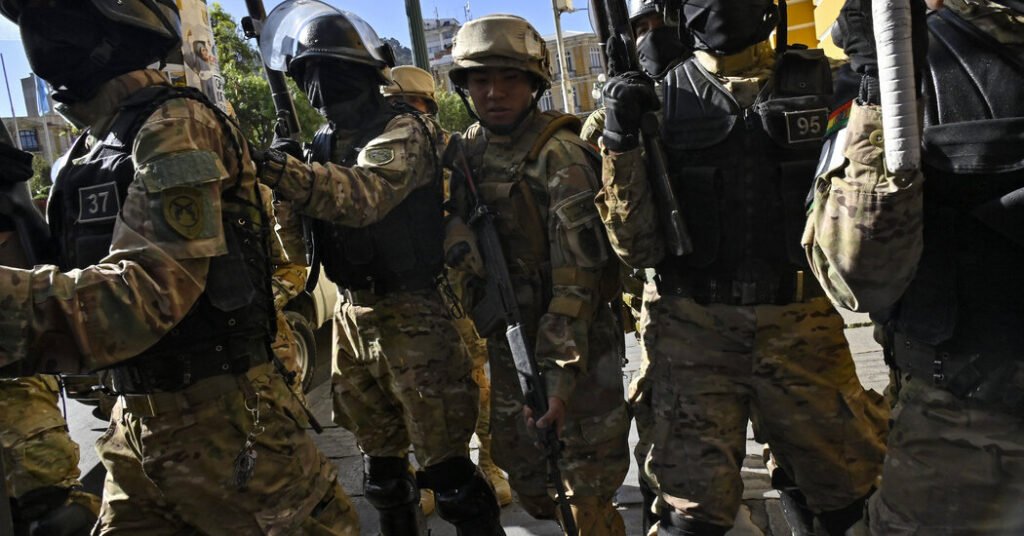Members of Bolivia’s top military and allied forces attempted to storm the presidential palace on Wednesday afternoon but quickly retreated, resulting in an apparent failed coup attempt.
A few hours later, the general was taken into custody.
Bolivian television footage showed security forces in riot gear taking over the central square of the administrative capital, La Paz, and camouflage military vehicles crashing into the palace doors as soldiers tried to break into the building.
Then, as quickly as he had appeared, General Juan José Zúñiga disappeared, his supporters in the military retreated, and were replaced by police officers supporting the country’s democratically elected president, Luis Arce.
President Arce called on Bolivians to “organize and rally against the coup and in support of democracy” before taking to the square.
“Long live the Bolivian people!” he shouted in a televised address. “Long live democracy!”
In the end, the afternoon attempt to break into the palace lasted only three hours. As time passed, it became clear that General Zuniga’s plan had little support.
Shortly before his arrest, General Zúñiga claimed, without providing any evidence, that Mr Arce had asked him to launch an attempted coup.
“The president told me,” Zuniga said as television cameras rolled, “that the situation is really bad, that this week is going to be crucial, and that I need to prepare something to boost my popularity.”
A short time later, police took the general away in a white police vehicle.
Representatives for Arce’s administration did not immediately respond to a request for comment.
The Attorney General’s Office said Wednesday night. investigation The ministry strongly condemned General Zuniga and “all other participants in the events of that day,” adding that it called for “maximum punishment” for those responsible.
Local media had previously reported that General Zúñiga had been fired this week, with some in the country believing this was linked to comments he made about former President Evo Morales, who was Mr Arce’s mentor.
The attempted coup comes at a tense time for Bolivia, a landlocked South American nation of 12 million people. Arce, a leftist who was designated to succeed Morales, the country’s first indigenous president and a Bolivian political heavyweight, is fighting with him for control of the party and candidates in 2025 elections.
Bolivia’s economy is struggling and President Arce has been accused of actions that critics call undemocratic, including the detention of opposition leader Luis Fernando Camacho and former President Jeanine Áñez.
During the attempt to seize the palace, General Zuniga briefly entered the building before emerging and speaking surrounded by masked security forces, according to local reporters. He criticized the Arce government and said the military was trying to establish “a real democracy, not a democracy for the few.”
He also called for the release of several jailed politicians and military figures, including Mr Áñez and Mr Camacho.
“Enough with rule by the few,” the general said. “Look at what it has done to us! No future for our children, no future for our people, and the military has the courage to fight for the tomorrow of our children.”
Shortly thereafter, President Arce confirmed he was replacing the army commander, General Zuniga, as well as the heads of the air force and navy.
The new commander, Gen. Jose Wilson Sánchez Velázquez, in a televised statement urged Gen. Zúñiga to “stop shedding the blood of our soldiers.”
The army’s initial action against the palace was immediately criticized by regional leaders, including Brazilian President Luiz Inacio Lula da Silva, who said “a coup has never been successful.” he told reporters. on wednesday.
Mexican President Andrés Manuel López Obrador has long praised both Arce and Morales. be criticized Bolivian President Arce condemned the attempted coup, saying his country’s “legitimate democratic government” had “no choice but to accept it.”
It was under Lopez Obrador’s administration that Mexico first offered Morales a landing spot and asylum after he resigned from office amid violent protests over election results in 2019.
Bolivia is no stranger to political turmoil — the deeply divided country has seen 190 coups in its 200-year history — and analysts say much of the military’s discontent stems from a sense that it ultimately defends the existing order, only to face political punishment or even jail for doing so once a new government comes to power.
But Bolivian political analyst Carlos Saavedra said there was little domestic support for the short-lived invasion, calling it “an adventure for a few soldiers.”
“There has been no mobilization in other parts of the country,” he said. “It appears that it was Zúñiga’s inner circle who wanted to take control of the army generals.”
Emiliano Rodriguez Mega Contributed report.

